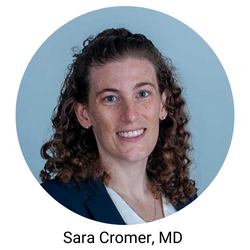NewsMar | 16 | 2023
Research Spotlight: Disparities in the Initiation of Guideline-Recommended Diabetes Medications
 Sara Cromer, MD, an investigator in the Division of Endocrinology at Massachusetts General Hospital, is the corresponding author of a new study in Diabetes Care, Deficits and Disparities in Early Uptake of Glucagon-Like Peptide 1 Receptor Agonists and SGLT2i Among Medicare-Insured Adults Following a New Diagnosis of Cardiovascular Disease or Heart Failure.
Sara Cromer, MD, an investigator in the Division of Endocrinology at Massachusetts General Hospital, is the corresponding author of a new study in Diabetes Care, Deficits and Disparities in Early Uptake of Glucagon-Like Peptide 1 Receptor Agonists and SGLT2i Among Medicare-Insured Adults Following a New Diagnosis of Cardiovascular Disease or Heart Failure.
What Question Were You Investigating?
Beginning in 2015, data began to rapidly accumulate regarding the benefits of glucacon-like peptide-1 receptor agonists (GLP1RA) and sodium-glucose cotransporter 2 inhibitors (SGLT2i) in patients with type 2 diabetes (T2D) and atherosclerotic cardiovascular disease, with SGLT21 also showing benefit in patients with T2D and congestive heart failure.
These finding resulted in a paradigm shift in the treatment of T2D, prompting updated recommendations for the use of the two medications as preferred second-line agents after metformin in qualified patients.
We wanted to know if the current guidelines recommending the use of these drugs in patients with type 2 diabetes and cardiovascular or renal indications were being followed, and if there were sex, race/ethnicity, or socioeconomic status-based disparities in their use.
What Was Your Approach?
Our team used a Medicare insurance claims database, restricted to individuals with type 2 diabetes, with a new indication for one of these medications occurring during the study period, AND with no contraindications for these medications. Based on current guidelines, all of these individuals should have received one of these medications.
What Did You Find?
Rates of medication initiation were very low (for every 100 people observed for 1 month, less than one of them filled a prescription for one of these medications). We also found that rates of receiving these medications were lower among Black and Other race/ethnicity individuals, women, and those living in more socioeconomically deprived zip codes.
We also found a signal that these medicines were more likely to be used in people with disease precursors (like early liver disease) than in people with end-stage disease (like cirrhosis).
What Are the Clinical Implications?
As these medications prevent heart attacks, hospitalizations for heart failure, progression of kidney disease to the need for dialysis, and even death, the low and unequitable rates of medication use are very concerning.
Further studies are needed to examine the reasons underlying these findings and their consequences in population health and health disparities.
Additionally, interventions are warranted to improve uptake of these novel therapies among patients for whom they are indicated.
Paper Cited:
Cromer, S. J., Lauffenburger, J. C., Levin, R., & Patorno, E. (2023). Deficits and Disparities in Early Uptake of Glucagon-Like Peptide 1 Receptor Agonists and SGLT2i Among Medicare-Insured Adults Following a New Diagnosis of Cardiovascular Disease or Heart Failure. Diabetes care, 46(1), 65–74. https://doi.org/10.2337/dc22-0383
About the Massachusetts General Hospital
Massachusetts General Hospital, founded in 1811, is the original and largest teaching hospital of Harvard Medical School. The Mass General Research Institute conducts the largest hospital-based research program in the nation, with annual research operations of more than $1 billion and comprises more than 9,500 researchers working across more than 30 institutes, centers and departments. In July 2022, Mass General was named #8 in the U.S. News & World Report list of "America’s Best Hospitals." MGH is a founding member of the Mass General Brigham healthcare system.
Type
Centers and Departments
Topics
Check out the Mass General Research Institute blog
Bench Press highlights the groundbreaking research and boundary-pushing scientists working to improve human health and fight disease.
Support Research at Mass General
Your gift helps fund groundbreaking research aimed at understanding, treating and preventing human disease.
